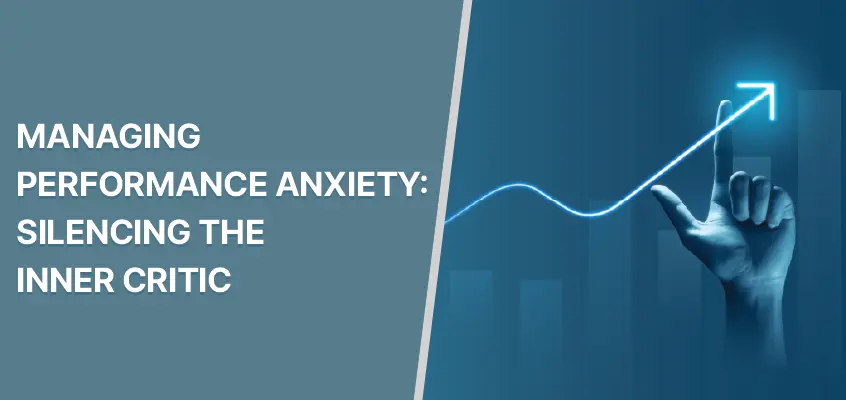Introduction
Many individuals have faced anxiety and nervousness before a big test or performance. While some bit of stress is helpful and improves a person’s performance, in some individuals, it can be extreme in some individuals. This powerful performance anxiety is often associated with a person’s inner critic who demands perfectionism. This article explores how to manage this inner critic and performance anxiety.
What is Performance Anxiety?
Performance Anxiety is an exaggerated fear of performing in front of others [1]. Usually, stage performers experience this anxiety, but it also includes a fear of performing on exams, performing sexually, and performing in sports. It can be considered an anxiety of evaluation [1] or a fear of failing, which hurts a person and their performance.
Performance anxiety has three aspects: cognitive, physiological, and behavioral. Usually, the symptoms include [2] [3]:
- Irrational thoughts around perfectionism or something going wrong
- Poor concentration
- High heart rate and palpitations
- Trembling
- Dry Mouth
- Sweating
- Breathlessness
- Nausea
- Dizziness
- Quavering voice
- Avoiding performances and auditions
- Interruptions in the actual performance
Since this anxiety has a social component and a fear of being judged in social contexts, many people consider it a part of social phobia [2] [3]. However, some authors have argued that it is much different and needs to be separated [4]. The reason is that, in many people with performance anxiety, their inner critic and expectations make them worry, unlike social phobia, where the fear of others judging becomes debilitating [4].
Why Do People Experience Performance Anxiety?
Many reasons make an individual suffer from performance anxiety. Some of these are:
- High Trait Anxiety: Many individuals are prone to feeling anxious and tend to find situations more threatening and overwhelming than others. Usually, people with high trait anxiety have higher chances of getting performance anxiety [5] [6].
- Perfectionism: Some people have high and unrealistic expectations of themselves. People with a tendency to perfectionism often experience high-performance anxiety and low satisfaction when goals are reached [3] [7].
- The perceived threat of an event: The perception that an event is threatening and critical increases performance anxiety. Often, performers overestimate the probability of a fearful event, underestimate their resources, and believe the event’s outcome is too important. It threatens the event and produces high-performance anxiety [3] [6].
- Negative previous experiences: When individuals have had negative experiences of humiliation and failure, their performance anxiety increases [6].
- Presence of Audience: The relationship of performance anxiety with the presence of an audience is complex. Performance anxiety is high when more people are present and increases when there are fewer, but chances of getting evaluated are high (e, auditions) [3].
- Impostor syndrome: People with impostor syndrome (the belief that they are incompetent despite being good at their jobs) usually have high-performance anxiety [8].
Some authors have attempted to make a framework to explain the relationship between performance anxiety causes, coping, and outcomes [6]. According to this framework, a person’s susceptibility to stress, their belief about their task efficacy, and the environment they are to perform together determine the level of performance anxiety.
Why Does The Inner Critic Show Up in Performance Anxiety?
As mentioned above, performance anxiety is closely related to perfectionism and impostor syndrome. Thus, negative beliefs about oneself and low self-esteem lead to performance anxiety [6]. Negative thoughts and low self-esteem, in turn, originate from the presence of a strong inner critic [9]. The inner critic is a voice within each individual that works towards highlighting a person’s shortcomings, and the inner critic makes the person doubt their worth and abilities.
In performance anxiety, the demands of perfectionism and the feeling of being an impostor indirectly provide the inner critic with the judgment that the person is not good enough.
Often, the voice shames a person before others can, and it wants them to avoid situations with high chances of ridicule [9]. In a performer, this voice will try to convince the person to avoid performance by making them anxious about it.
What are Some Strategies for Managing Performance Anxiety?
Performance anxiety can be debilitating for some people, and it can reach an extent where their careers as performers become impacted. In students, it can hamper their performance in exams as well. An individual must learn how to manage their performance anxiety. Some strategies are:
- Psychotherapy: Meeting a psychotherapist can be fruitful for individuals with debilitating performance anxiety. Various techniques like Cognitive Behavioral Therapy [3], multimodal behavioral therapy [8], and psychoanalysis have been used to treat performance anxiety.
- Pre-Performance Routine: Many performers have a pre-performance routine that helps them get into the performance mindset. It can include several things, from warm-up to relaxation or isolating oneself. A pre-performance way can allow the person to tackle the anxiety that may be building up actively.
- Relaxation techniques: Individuals can learn several relaxation techniques, such as mindfulness, deep breathing exercises, muscle relaxation, etc., to manage anxiety. It can be done as a pre-performance routine or a regular practice [3].
- Redefining success: Often, anxiety stems from the belief that one will fail, make mistakes, or not be good enough. Redefining the meaning of success and what it means to create a mistake can help with anxiety. It has been found that performance anxiety is reduced when success is seen as giving your best, growing and learning, or gaining mastery, and making mistakes are seen as valuable [10].
- Learning Self-Compassion: Since self-criticism is often the root of performance anxiety, learning techniques that promote compassion towards oneself can help. It has been found that self-criticism and anxiety are significantly reduced with interventions like Compassion Mind Training [11].
Performance anxiety can harm a person, but learning how to manage it can empower individuals and allow them to perform their best.
Conclusion
Several individuals face performance anxiety when performing in front of others or having an essential task. It becomes debilitating and often stems from their inner critic trying to convince them they are not good enough. These negative self-beliefs can have significant effects on one’s performance. With some simple strategies, one can learn how to manage performance anxiety. Psychotherapy is often one of the best solutions for resolving one’s issues. If you are struggling with performance anxiety, contact the experts on the United We Care Platform. At United We Care, a team of wellness and mental health experts will guide you with the best methods for well-being.
References
- J. Southcott and J. Simmonds, “Performance anxiety and the inner critic: A case study: Semantic scholar,” Australian Journal ofMusic Educationn, 01-Jan-1970. [Online]. Available here: [Accessed: 05-May-2023].
- L. Fehm and K. Schmidt, “Performance anxiety in gifted adolescent musicians,” Journal of Anxiety Disorders, vol. 20, no. 1, pp. 98–109, 2006.
- R. Parncutt, G. McPherson, G. D. Wilson, and D. Roland, “Performance Anxiety,” in The Science & Psychology of Music Performance: Creative Strategies for teaching and learning, Oxford: Oxford University Press, 2002, pp. 47–61.
- D. H. Powell, “Treating individuals with debilitating performance anxiety: An introduction,” Journal of Clinical Psychology, vol. 60, no. 8, pp. 801–808, 2004.
- “Student Services Student Services Student Services Test and S …” [Online]. Available here: [Accessed: 05-May-2023].
- I. Papageorgi, S. Hallam, and G. F. Welch, “A conceptual framework for understanding musical performance anxiety,” Research Studies in Music Education, vol. 28, no. 1, pp. 83–107, 2007.
- S. Mor, H. I. Day, G. L. Flett, and P. L. Hewitt, “Perfectionism, control, and components of performance anxiety in professional artists,” Cognitive Therapy and Research, vol. 19, no. 2, pp. 207–225, 1995.
- A. A. Lazarus and A. Abramovitz, “A multimodal behavioral approach to performance anxiety,” Journal of Clinical Psychology, vol. 60, no. 8, pp. 831–840, 2004.
- “By Hal Stone, Ph. DD. Sidra Stone, Ph.D. D.” [Online]. Available here: [Accessed: 05-May-2023].
- R. E. Smith, F. L. Smoll, and S. P. Cumming, “Effects of a motivational climate intervention for coaches on Young Athletes’ Sport Performance Anxiety,” Journal of Sport and Exercise Psychology, vol. 29, no. 1, pp. 39–59, 2007.
- P. Gilbert and S. Procter, “Compassionate mind training for people with high shame and self-criticism: Overview and pilot study of a group therapy approach,” Clinical Psychology & Psychotherapy, vol. 13, no. 6, pp. 353–379, 2006.





